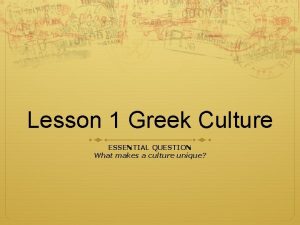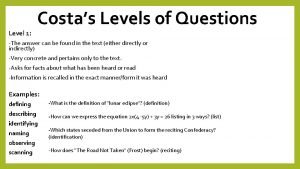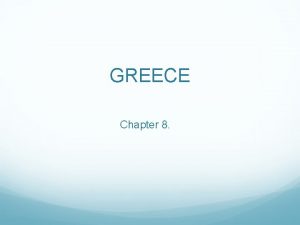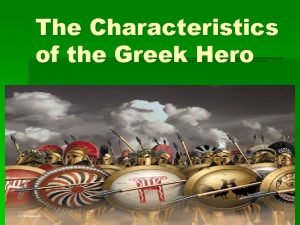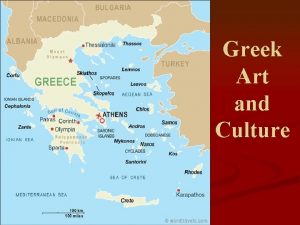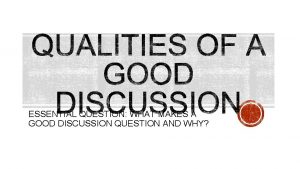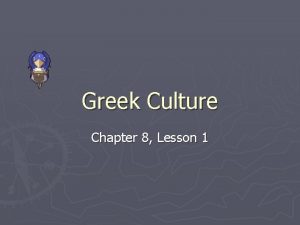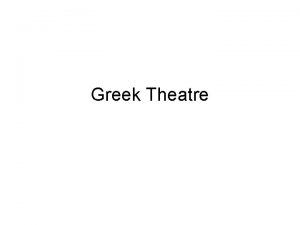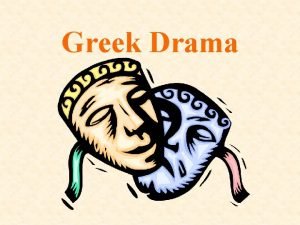Lesson 1 Greek Culture ESSENTIAL QUESTION What makes










- Slides: 10

Lesson 1 Greek Culture ESSENTIAL QUESTION What makes a culture unique?

Terms myth a traditional story that explains a culture’s beliefs or part of the natural world ritual words or actions that are part of a religious ceremony oracle a priestess who speaks for the gods and answers questions about what will happen in the future fable a story that teaches a lesson oral tradition the custom of passing stories from one generation to the next by telling the stories out loud drama a story that is told by the actions and spoken words of actors tragedy a drama in which characters struggle to overcome problems, but fail comedy a drama that tells a humorous story

Greek Beliefs The Greeks believed in many gods and goddesses, and they told myths about them. Greek myths are traditional stories about gods and heroes. The Greeks believed these gods affected everyday life. Every city-state had a god or goddess who protected its people. The Greeks worshiped their gods in temples and at home. The Greek gods and goddesses had great powers. However, the Greek people did not fear them because the gods acted like humans. Greeks believed the 12 most important gods and goddesses lived on Mount Olympus and were protected by a gate of clouds. Zeus was the king of the gods.

Greek Beliefs To please their gods, the people performed rituals, or religious ceremonies in honor of the gods. They had festivals, or celebrations, and feasts for the gods. They prayed and offered gifts to the gods. They believed that the gods were pleased when the people showed skill in the arts or athletics. Every four years they had athletic competitions, called the Olympic Games. The Greeks believed that the gods made prophecies, or predictions, to help people plan for the future. People who wanted to know the future or listen to other advice visited an oracle. This was a priestess who talked to the gods from a room deep inside a temple. People asked the priestess questions. She told her answers to the priests. Then the priests translated the answers. The most famous oracle was at the Temple of Apollo in Delphi.

Epics and Fables Greek poems and stories are some of the oldest in the Western world. Many writers have used ideas from these old stories, like England's William Shakespeare. The Iliad • written about 700 B. C. • story of a war between the Greeks and the people of Troy • Troy won the war using a wooden horse

Epics and Fables The Odyssey • written about 700 B. C. • story of the hero Odysseus • adventures of Odysseus going home from the Trojan war

Epics and Fables The earliest Greek stories were called epics. Epics are long poems about heroes and their brave deeds. Homer wrote two great Greek epics: the Iliad and the Odyssey. Homer wrote them both in the 700 s B. C. The Iliad tells of a war between the Greeks and the people of Troy. The story describes how this war was won with a wooden horse. The Odyssey tells about the hero, Odysseus, and his long journey home from the Trojan War. The Greeks believed that the Iliad and the Odyssey were true stories. These epics gave them a history filled with heroes and brave deeds. Homer’s stories taught important lessons, such as, friendship and marriage should be valued. Homer’s heroes were role models for the Greeks.

Epics and Fables Have you heard the story of “The Boy Who Cried Wolf? ” This story and others like it were said to have been written by a man named Aesop. He is supposed to have lived around 550 B. C. Historians now know that there was probably never anyone named Aesop who wrote these stories. However, the stories do exist. They are known as Aesop’s fables. Fables are short tales that teach a lesson. They always have a point, or moral. The moral is a truth that teaches a useful life lesson. Fables are often funny and show human weaknesses and strengths. Aesop’s fables were part of Greece’s oral tradition for about 200 years. This means that people told the stories out loud to their children and grandchildren. Later, people wrote down the fables. Aesop’s fables are read and told today by people all around the world.

The Impact of Greek Drama A drama is a story told by people who act out the events. They play the parts of the characters in the story, saying their words and acting out their feelings and actions. Movies, plays, and television shows are often dramas. The Greeks developed two types of drama—tragedy and comedy. A tragedy has an unhappy ending. The characters in a tragedy cannot solve their problems no matter how hard they try. The first Greek plays were tragedies. Later the Greeks wrote comedies. A comedy ends happily. Today, we use the word comedy to mean a funny story. For the Greeks, a comedy was any drama with a happy ending. In ancient Greece, women were not allowed to act. Men played all the parts, even the female characters. For the Greeks, dramas were part of religious festivals. Greek dramas dealt with big ideas, such as the meaning of good and evil and the rights of people.

Greek Art and Architecture Greek artists created art that expressed the ideals of order, balance, and harmony. This style of art is now known as the classical style. Greek artists painted on pottery, using red and black paint. Large vases often have pictures from myths. Small pieces, like cups, have pictures from everyday life. The Greeks built beautiful buildings. These buildings had large columns to support the roof. The most important buildings were the temples. Each temple was dedicated to a god or goddess. The Parthenon of Athens honored the goddess Athena. Many Greek temples were decorated with sculpture. Sculpture, like all of Greek art, expressed artists' ideas of perfection and beauty.
 What makes a question essential
What makes a question essential What makes greek culture unique
What makes greek culture unique Level 3 questions
Level 3 questions Chapter 8 lesson 1 greek culture
Chapter 8 lesson 1 greek culture Essential non essential fatty acids
Essential non essential fatty acids What are the characteristics of a greek hero
What are the characteristics of a greek hero What is an example of a testable question
What is an example of a testable question Questions about figurative language
Questions about figurative language The pythagorean theorem
The pythagorean theorem Essential question generator
Essential question generator Pythagorean theorem essential questions
Pythagorean theorem essential questions

